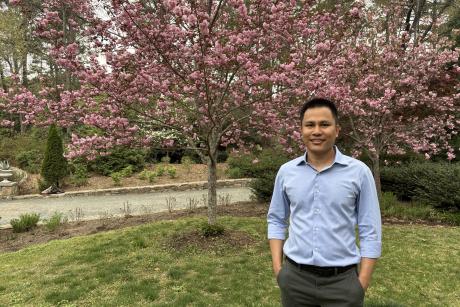When asked to contemplate how long the COVID-19 pandemic may last, Dr. Ayoade Olatunbosun-Alakija offers a sobering response: “It really depends on where in the world you are sitting.”
For people in many parts of the United States and Europe, the horizon may be starting to look brighter as vaccination rates climb and new COVID cases wane, notes Olatunbosun-Alakija, co-chair of the African Union African Vaccine Delivery Alliance.
“If you are in the Global South, however, you’re really looking at a world where COVID is going to become your future,” she said. “COVID is going to become the disease of Africa, the disease of the low-income countries of the world.”
Olatunbosun-Alakija’s comments, made during the Duke Global Health Institute’s Oct. 12 webinar, “The COVID-19 Endgame,” framed the urgent situation facing the world as it struggles to gain an upper hand on the novel coronavirus. While many wealthy countries have been able to secure enough vaccines and medications to bring outbreaks under control, much of the world remains unprotected and vulnerable.
The webinar featured experts from several parts of the world to offer perspective on lessons learned in local efforts to acquire and distribute vaccines and what obstacles remain in controlling the pandemic.
“What I heard today is that we need to recognize that we are closer to the beginning than the end of this pandemic,” said Krishna Udayakumar, M.D., a Duke professor of medicine and global health who moderated the discussion. “The global response has to be grounded in much more equity than we’ve seen so far as well as a greater sense of urgency, recognizing the real challenges on the ground.”
Watch the full webinar below, or scroll down for highlights.
About the Speakers
Krishna Udayakumar, M.D., is aDuke professor of medicine and global health and director of the Global Health Innovation Center.
Dr. Ayoade Olatunbosun-Alakija is co-chair of the African Union African Vaccine Delivery Alliance and founder of the Emergency Coordination Centre, in Nigeria.
Ann Lindstrand is the World Health Organization's unit head for the Essential Program on Immunization of the Department of Immunization, Vaccines and Biologicals.
Alberto Valenzuela is the Executive Director of the Pan American and Parapan American Games Legacy Project, a government entity that coordinated logistics and vaccination sites as part of Peru’s COVID-19 response.
Highlights
(times correspond to the YouTube recording)
3:00: Ann Lindstrand shares data on global vaccination rates, noting that 6.5 billion doses of COVID-19 vaccines have been administered thus far, but that “appalling inequity” remains in which countries have been able to acquire vaccines.
16:30: Ayoade Olatunbosun-Alakija describes the likelihood that low-income countries will continue to have to fight COVID-19 for many years. The emergence of dangerous variants only occurs “because the world failed to do what is right” in ensuring broad access to vaccines and medicines, she notes.
21:05: Olatunbosun-Alakija describes the situation in Nigeria, where less than 1 percent of the population has been fully vaccinated. “Enough of the congratulatory messages. Let us look ourselves in the eye and talk about the hard facts about people who are dying,” she says.
24:15: Alberto Valenzuela describes the effort to build temporary facilities in Peru to provide oxygen and clinical services to people sick with COVID-19 and how this operation shifted gears to provide vaccinations.
38:00: Lindstrand addresses what the global community needs to do to increase vaccinations in low-income countries. “The best knowledge is in the countries. They know what is needed, when it is needed,” she says”. “We need to open those channels and respond much more quickly.”
40:00: Olatunbosun-Alakija says the lack of coordination in the global response to COVID-19 shows “we have failed to learn the lessons we should have learned from the HIV/AIDS pandemic.”
45:00: Valenzuela discusses the role of the private sector and the need for coordination between governments and businesses to effectively deploy new tools and response mechanisms.
52:40: Lindstrand says, “We need the voices of the young to push forward on this unacceptable vaccine inequity.”
55:48: Olatunbosun-Alakija says global health students’ voices are needed to help the world see the injustice of vaccine nationalism. “We need them to agitate for change and to make political leaders accountable.”



